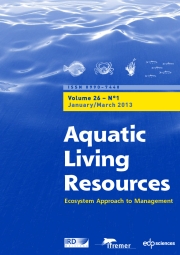Article contents
Ontogenetic changes in behaviour transmission among individuals in the schooling of Pacific bluefin tuna Thunnus orientalis
Published online by Cambridge University Press: 05 August 2011
Abstract
To reveal the kinematical aspects of schooling development in the Pacific bluefin tuna Thunnus orientalis, changes in its schooling behaviour traits, local behaviour transmission among school members and morphological traits were investigated as fish developed from the larval to the juvenile stage. Schooling was first observed at around 24 days post-hatching (27 mm body length) in T. orientalis. Behaviour transmission among individuals took much longer among 24 d post-hatching individuals than among older fish. The compactness and polarity of the school progressively improved as the time required for behaviour transmission decreased. One cause of the reduction in the time required for behaviour transmission was the development of manoeuvrability, which resulted from further morphological development of the caudal fin and other organs related to swimming.
Keywords
- Type
- Research Article
- Information
- Copyright
- © EDP Sciences, IFREMER, IRD 2011
References
- 1
- Cited by


